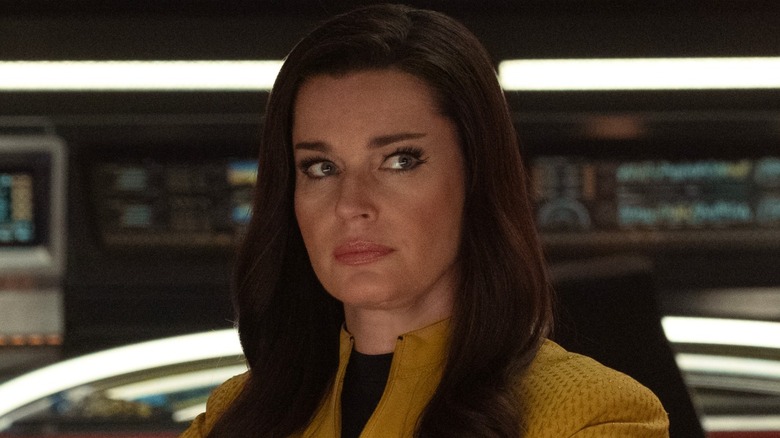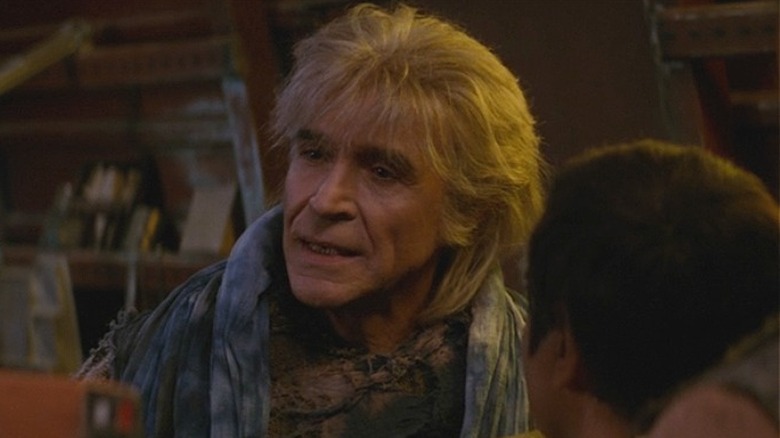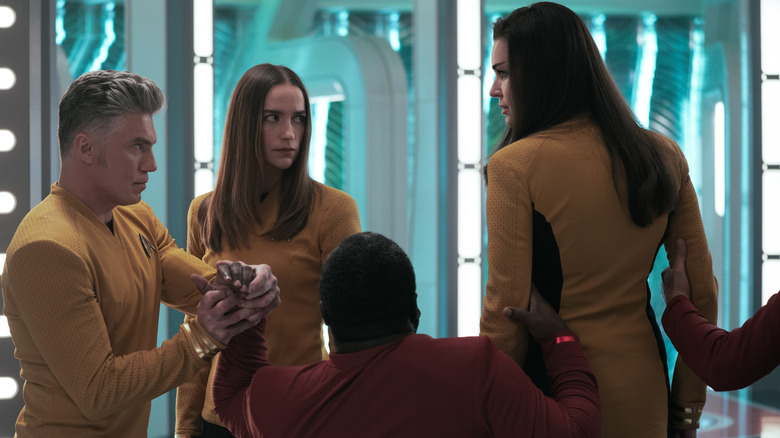Star Trek: SNW S2E2 Puts The Spotlight Back On Genetic Engineering
Contains spoilers for "Strange New Worlds" Season 2, Episode 2 — "Ad Astra Per Aspera"
Starfleet is generally known for its acceptance of many different cultures and alien species, but there are some rules when it comes to who is allowed to serve in the galaxy-spanning organization. At the end of Season 1 of "Star Trek: Strange New Worlds," Una Chin-Riley (Rebecca Romijn) is arrested after the authorities are alerted to the fact that she is an Illyrian — a humanoid species that engages in genetic modification as a cultural practice.
Luckily, Una is the first officer of Captain Pike (Anson Mount), who wastes no time in vowing to clear her of all charges. In Episode 2, it is revealed that he left the Enterprise to convince an Illyrian lawyer to defend Una at her court-martial, to which the remainder of the episode is dedicated.
The reason why genetic modification is so frowned upon in Starfleet is due to the Eugenics Wars, a series of conflicts that left over 30 million people dead and resulted in the devastation of Earth. In fact, they made such an impact on the United Federation of Planets that genetic engineering was banned and those who had been augmented were prohibited from enlisting in Starfleet.
The Eugenics Wars left a deep scar on the Federation
One doesn't have to look far to see how and why eugenics is viewed so negatively among the Federation. One of the most notable villains of the original "Star Trek" series is Khan Noonien Singh (Ricardo Montalban), a powerful tyrant on Earth during the Eugenics Wars.
As a genetically engineered human, Khan is much smarter and stronger than a baseline human, which unfortunately instills in him an incredible sense of superiority. Aside from Khan, there were other augmented humans that shared similar traits, although they were originally designed that way in the hope that their advanced intelligence and physical traits would usher in an era of peace.
Unfortunately, these genetically enhanced humans instead became tyrants, resulting in around 30% of Earth's population being killed. Considering this, it makes perfect sense as to why Starfleet would be apprehensive about genetically modified individuals and why they would not be allowed to serve in a military organization, for fear of history repeating itself.
Una Chin-Riley's genetically modified status is a major plot point of Strange New Worlds
We first find out that Una isn't human in Season 1, Episode 3, "Ghosts of Illyria," in which it is revealed that her genetic modification makes her immune to the light virus that has infected nearly everyone on the ship. Unfortunately, she doesn't have any antibodies, so she spends her time trying to come up with a solution while protecting her crew from the effects of the virus, which include self-harm as a result of trying to get as close to a light source as possible. Eventually, Nurse Chapel (Jess Bush) is able to synthesize an antidote using chimeric antibodies that have developed in La'an (Christina Chong) due to her proximity to Una, thus saving the entire crew.
Una has proven herself to be a selfless leader, and her absence is keenly felt even in the very first moments of Season 2 of "Star Trek: Strange New Worlds." The fact that such a high-ranking member of Starfleet is court-martialed despite her exemplary record, just for hiding her genetic modification, is a testament to how deep the Federation's fear of another Eugenics Wars runs, something that is evidently to its detriment given that Illyrian technology could greatly enhance the lives of Federation citizens. However, considering Una's position as first officer, this likely won't be the last time audiences get a chance to hear about the pros and cons of genetic augmentation.


